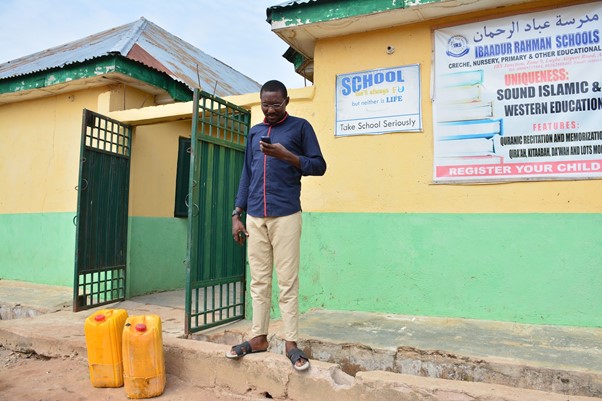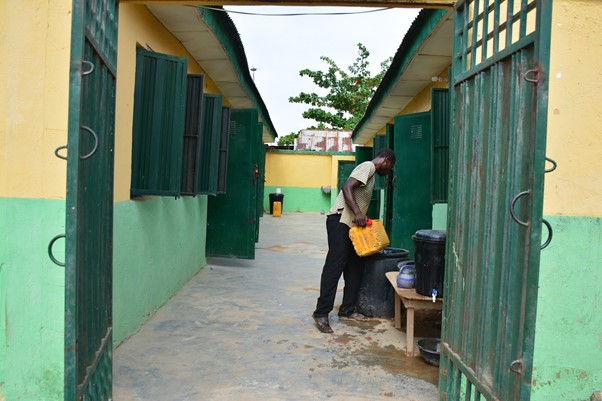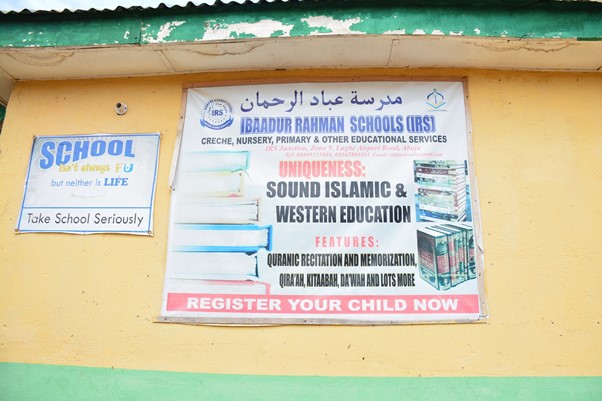Zubair: On A Mission To Teach Islamic, Conventional Education To Children
The sight of children carrying bowls and begging for alms on the streets of Minna in Niger State, North-central Nigeria, put Mallam Abdulfatir Zubair on a mission to build a school that would provide both Islamic and conventional education to the underprivileged.

Armed with a Bachelor of Science (BSc) in Mathematics and Computer Science from Federal University of Technology, Minna (FUTMINNA), Niger state, North-central Nigeria, Abdulfatir Zubair started the Ibaduur Rahman School, where Islamic and conventional learning takes place.
But this did not happen in a day.
How it all started
Mallam Zubair, who is from Okehi Local Government Area (LGA) of Kogi State, North-central Nigeria, attended a christian missionary school, ECWA Secondary School in Mopa, Kogi State.
While studying at FUTMINNA, seeing young children on the streets of Minna begging for alms and the realisation that they are discouraged from formal education disturbed Zubair.
“Having the mental picture of what I wanted to achieve and the quest to balance religion and civilization, I undertook Islamic teachings with an Islamic scholar during my undergraduate years, and on graduating, having served in the NYSC and got married, I set up the school.”
Designing a model for children where they would hold firm the tenets and morals of Islamic religion on one hand, and western education on the other, was the concept behind Zubair’s approach.
So Zubair started the school in 2018 in Abuja, Nigeria’s capital, with not more than 10 pupils, including his children.
But there were a few challenges, such as setting up the school and having to build a relentless team of teachers.
Zubair’s model and almajiranci
Almajiri (plural: Almajirai) is a Hausa term for referring to young boys in an informal education system where the boys acquire Islamic knowledge from scholars. The students are sent to faraway cities for this acquisition.
The practice is done across the Muslim majority in West African communities. The state and emirs adequately funded it, alongside parents of the children, and other organised platforms, and this covered shelter, clothing, and feeding for the students. The system has since deteriorated after the British invasion.
Nigeria has about 13.2 million out-of-school children. In West Africa, while Nigeria accounts for 45 per cent of out-of-school children, 69 per cent are from Northern Nigeria, with 60 percent of them comprising girls.
Conflict experts also hold that having vulnerable children in cities across a nation fighting an ideological war is a terrible risk.
“We have about 60 children in the school now and up to grade four pupils,” Zubair told HumAngle.

Zubair stressed the dangers of teachings against education. “Islamic education is paramount, so also is learning skills for societal growth and advancement of peace among humans, which is where education and enlightenment comes in.”
“Many of these Islamic teachers warned the kids to shun conventional education because it was perceived as the way of the infidels where you would be given education and your religion is taken away from you. This explains why people resort to street begging or arms carrying to survive,” Zubair explained.

Unlike the almajiri system, children in Ibaduur Rahman School come from regular homes where their parents look after them.
With the meagre resources available to him, Zubair accommodates a few orphans, granting them special consideration in the school.
One of them, Zubaiduur Masueed, lives with her uncle but benefits from the special programme for orphans and the less privileged set up by Zubair and his team.
Ten-year-old Zubaiduur, who is in basic class three, told HumAngle she has been in the school for over a year and finds the curriculum beneficial because her former school does not teach anything related to Arabic.
“In my former school at Okene when I was still with my parents, I usually left home for school in the morning, and after school hours every evening I went to Islamiya. Sometimes I become too tired to even do my assignments,” she said.
Abdumalik Atolagbe, 10, who is in basic class three, joined the school in May, 2021 after he relocated to Abuja from Lagos.
“I want to grow up and become a great Islamic teacher and doctor. I will build schools like this, where maths and other subjects will be combined to be taught,” he said.
Zubair combines the full curriculum of conventional basic primary education with basic Islamic knowledge of morals and ethics in his school.

“The morals of the religion through the Qur’an and Hadith can be registered in the mind of the children, while we also achieve the better part of conventional education in one single system. We need to evolve with time irrespective of religion,” Zubair stressed, adding that such children have an edge over their peers.
Dangers of neglecting conventional education
“There is a difference between a child left to grow on their own and those trained for growth in a certain direction. Many of the almajiri kids in Islamic centres where conventional education is shunned are trained to grow on their own without direction. The very practice of alms begging is hazardous to society,” Zubair noted.

He also added that: “Education opens the mind to realities of present day opportunities and how one could make best use of it for the growth and betterment of the society.”
“So, a child limited to religious teachings alone is already at a disadvantage in terms of ideologies and opportunities.”
Support Our Journalism
There are millions of ordinary people affected by conflict in Africa whose stories are missing in the mainstream media. HumAngle is determined to tell those challenging and under-reported stories, hoping that the people impacted by these conflicts will find the safety and security they deserve.
To ensure that we continue to provide public service coverage, we have a small favour to ask you. We want you to be part of our journalistic endeavour by contributing a token to us.
Your donation will further promote a robust, free, and independent media.
Donate Here




